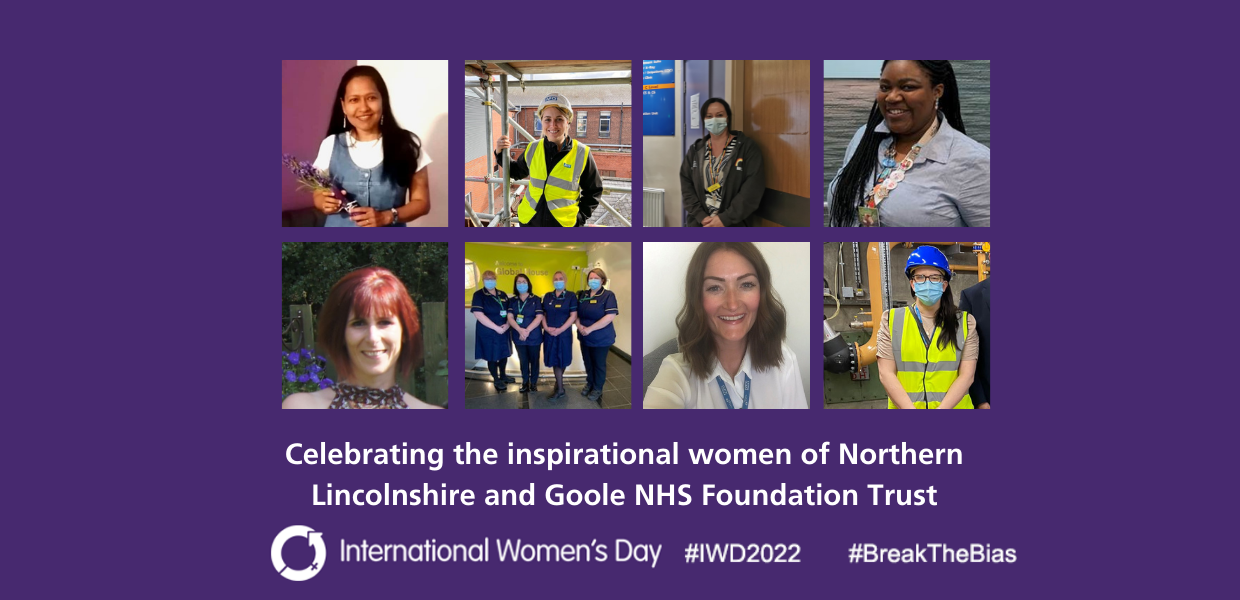On this page
Today we are celebrating International Women’s Day.
Our staff are NLaG and we’re extremely proud of every member of our team and, with 80% of our workforce made up of fantastic, inspirational women, we’ve got a lot to celebrate!
Across every department and almost every role – from doctors to engineers – the women of NLaG are instrumental to the way we work and a true force to be reckoned with.
And, as part of today’s celebrations, we to share some of their inspirational stories with you.
Emma Barratt – our first female engineer
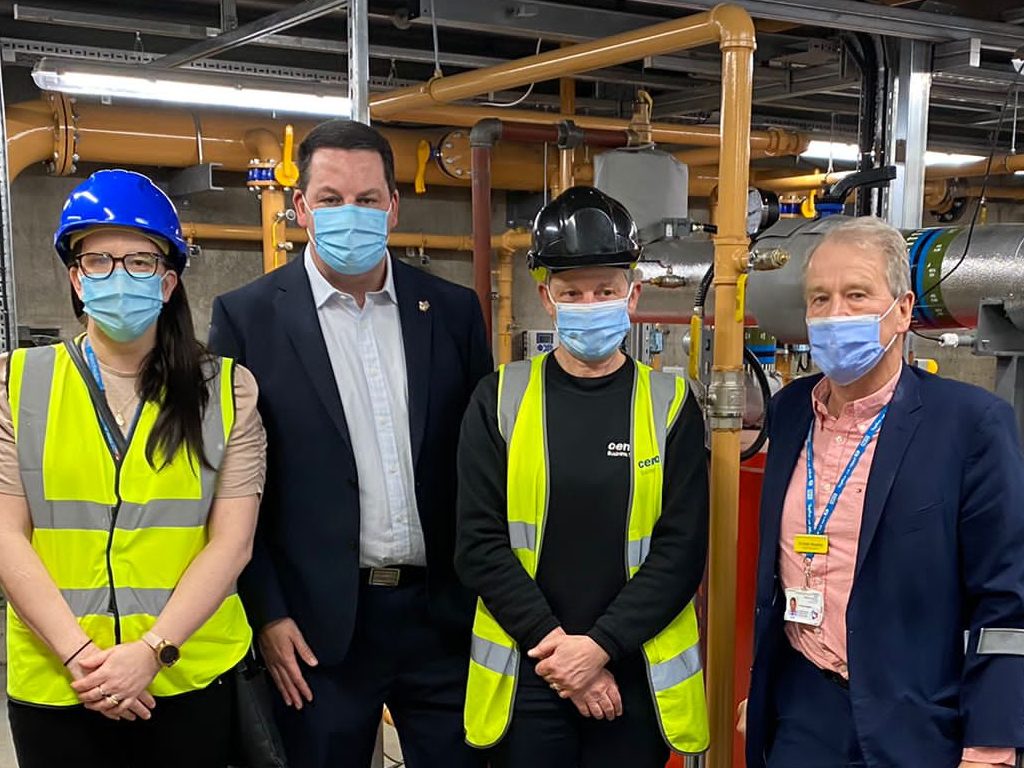
This month Emma Barrett became our Trust’s first female Engineer – taking control of our Building Management Systems across our sites.
It’s not a career she ever set out to go into but, having started working in administration for the Trust in 2009, her excellent skills and interest in problem solving shone through.
As a result, Emma took the opportunity to move into roles that allowed her to grow and develop her talents – and she’s never looked back.
She said: “I never had that ‘when I grow up I want to be a…’. I have always worked on the basis of looking at the opportunity put in front of me and seeing what comes along.
“When I first started with the Trust I had just had my second child. I took on a 12 month fixed-term contract in training and development and really enjoyed it.
“I wanted to stay in the NHS and an opportunity came up to work in admin within our Estates and Facilities team.
“I love problem solving and computers, playing with software and understanding how things work.
“I’ve always been intrigued by what other people do and I had an interest in the role of our data analysts, so when a role came up in Compliance and Information that allowed me to do it, I went for it.
“But I love Estates and Facilities. I really like having an understanding of how everything works to support the clinical staff and knowing that we can’t work without them and they can’t work without us.
“I got the opportunity in the last year to come back into Estates and Facilities as a Project Manager, looking after the removal of the old coal fired boilers at our hospital in Goole and implementing more sustainable and energy efficient systems.
“I have been really lucky in working closely with our now Director of Estates and Facilities Jug Johal and the Deputy Director of Estates and Facilities Simon Tighe.
“Simon has been a really great mentor and has always pushed me to develop further in Estates and Facilities.
“I kept getting told ‘this is a launch pad for you Em’ and it really has been. I think my background in administration has stood me in good stead in a number of ways.
“I’ve brought my organisational and problem solving skills to the role but I have also benefitted from my overall experiences to date, watching other managers and how they work and taking advice from my line managers.
“In the last 12 months, I have been able to focus more on the analytical side of things – like looking at the Building Management System and how things work. I’ve loved figuring out how a computer system can tell an air handling system unit to switch on or off.
“It’s through this that I have had the opportunity to become the Building Management System Engineer, which will also enable me to undertake a degree funded by the Trust.
“I never set out to be a female engineer but I feel like I have definitely found my niche.
“Everyone has been so supportive and happy to answer any questions I have and explain to me how things work when I don’t know. This team is like a family and many of them have seen me grow into this role over the years.
“My advice to anyone wanting to get into this kind of role is just to take the opportunities that are offered to you and ask questions – lots of questions!”
Noku Sibanda – Cancer Team Leader
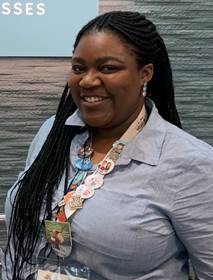
For Nokulunga Sibanda, having an analytical brain has helped her not only to identify opportunities but to make the most of them.
After completing a Finance degree, Noku started out her career with Deloitte as a Junior Finance Assistant.
However, after deciding it was time for a new challenge, she made the leap to the NHS, joining us as Medical Secretary in the Ophthalmology Department.
And it wasn’t long before she took on the role of Team Leader in Surgery and Critical Care in the Head and Neck Division.
She said: “It was very challenging. I’d done a finance degree and here I was learning how to speak NHS!
“Coming from a finance background, I had never thought I would be involved in the public health sector – it was definitely a case of ‘learn as you go, learn as you grow’.
“However, the Trust has provided me the tools I needed to make these transitions and continue to thrive.
“If you ask the right questions, the information is there and people will support you and help to push you in the right direction.”
Noku added: I had come to Grimsby from Birmingham, so there were some cultural barriers as we all came from very different backgrounds. When I joined the Trust; it was at the height of the Pride and Respect campaign, which was all about highlighting tolerance and understanding of other cultures and backgrounds which made the transition into this new space manageable for me”
After four years in the post, Noku spotted an opportunity to move in to the Cancers team.
She laughed: “Ironically, at my first PADR within the Trust I expressed that I wanted to be involved in cancers somehow. “That’s something I love about working for the NHS. You get the space and the support if you want to cross over into different things. The opportunities are there if you want to take them.”
Cath Butterill – Head of IT Operations
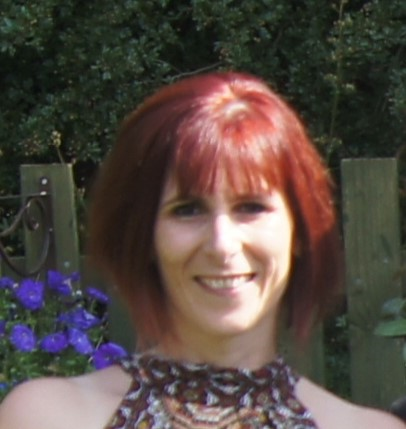
When she left school Cath Butterill was going to be a social worker, nurse or a police officer.
But instead, the girl who could (and did) take down the school’s IT network embarked on career with us which eventually saw her become our IT Operations Manager.
She helped get us through the infamous Wannacry cyber attack on the NHS back in 2017 and, more recently, she and her team designed a system in the space of a weekend to allow hundreds of staff to work from home during the pandemic.
And it all started when she joined us as a volunteer to get some experience while she was job hunting.
She said: “I never expected to go into IT.
“I started out with the Trust as a volunteer in 1995, having just left college. I was working in pubs but I wanted a full time job and I contacted the hospital to see if they had any volunteer work I could do.
“I started out working in Clinical Coding, Research and Development – just doing cups of tea and little data returns, getting myself some experience.”
In October that year, she became the first person at the Trust to do a NVQ Way Ahead apprenticeship, getting an NVQ Level 2 in Business Admin.
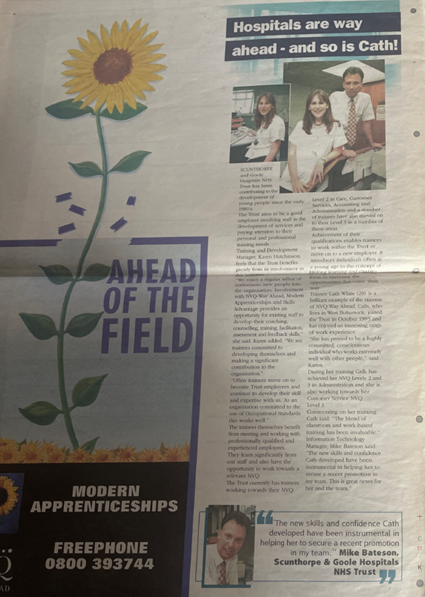
She began to do more hours for the Information team and it was here that her potential was spotted by the then head of IT.
Cath said: “He said to me ‘we need to keep you. You’re a good resource’ and offered me a six month contract.
“Then, as my contract was coming to an end, the Trust was just about to bring in a new system. The head of IT recognised that I had a strong work ethic and offered me a permanent post as a service desk administrator.
“My friends couldn’t believe it when I told them. They remembered what it had been like at college when I used to take the network down in IT lessons – but, looking back, that happened because I was intrigued.
“I was looking and going ‘What does this do? What’s that command for?’. Obviously my head did want to do a little bit of IT!”
Again, Cath’s talent and determination stood out and it wasn’t long before she was promoted to an IT trainer – getting a qualification in adult learning at night school as she went.
But it wasn’t for her and she moved into a role as a software engineer, then worked as a generic IT technician before being seconded to implement the newly launched Freedom of Information Act before becoming a network engineer.
Following a brief stint in IT Security, she took her first leadership role in 2012 and has continued to rise to her current position as Head of IT Operations.
While, thankfully, she said that the culture is very different now, Cath did find that she was treated differently during her earlier career.
She said: “When I first started as a technician most people in that role were men.
“I would phone service users to talk them through their issue and they used to say to me ‘I need to talk to an IT Technician’ and I would have to say ‘I am an IT Technician”.
“I also vividly remember a supplier coming to talk to us about a new system when I was a network engineer.
“I was the only woman there and there were colleagues from our Trust and Hull Teaching Hospitals too.
“He asked us to introduce ourselves and went to all the men first, then turned to me and said ‘and I assume you’re the administrator of it all then?’
“If that happened now I would have the strength and assertiveness to say ‘please don’t assume. Don’t put bias on this’ but at the time I just corrected him.
“That really impacted on me. I remember what I was wearing. I remember everything.
“It doesn’t happen now. We still see more men than women in IT but the culture has definitely changed.
“I don’t think that women would see that behaviour I had if they come into the profession now and I would definitely recommend it as a career choice.
“My advice would be to get as much experience as you can. I am a person that feels you need to start at the bottom and learn the trade before you move into a leadership position.
“It’s about having that determination and fire in your belly.”
Gemma Petherbridge and Ellie Rodger – the women who built our new MRI suites
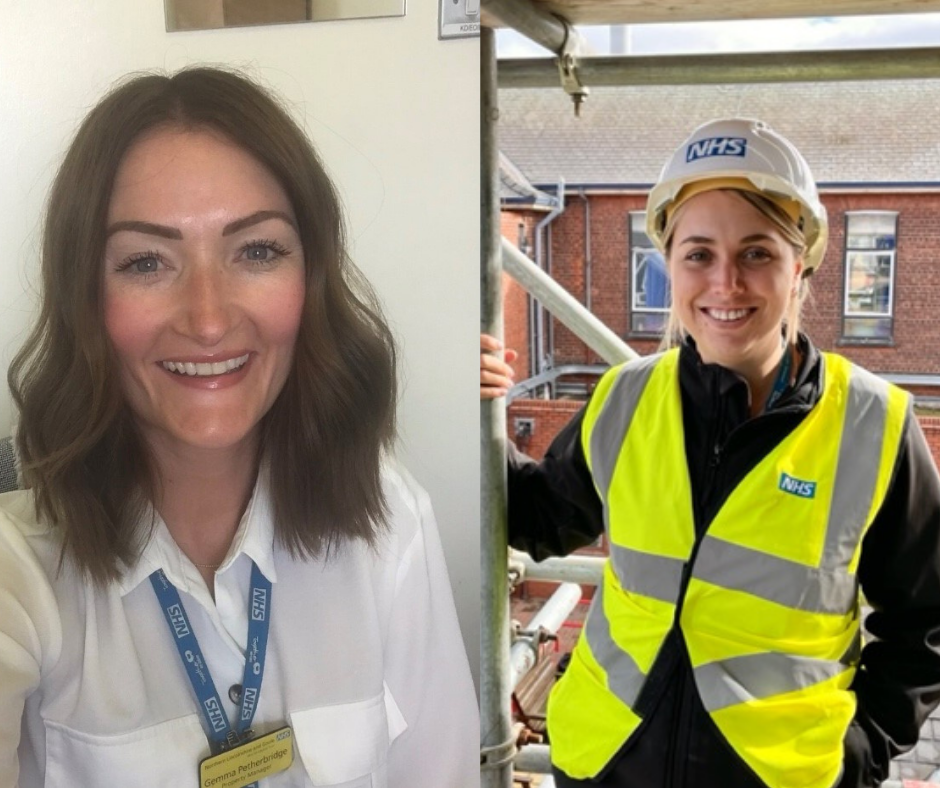
Recently we built a new MRI suite at Grimsby Hospital and significantly extended the MRI suite at Scunthorpe.
These were significant programmes of work, doubling our scanning capacity and vastly improving the quality of the facilities available at both sites.
The programmes were led by Senior Project Manager Gemma Petherbridge (Grimsby) and Capital Project Manager Ellie Rodger (Scunthorpe) from our Estates and Facilities (E&F) team.
We caught up with them to find out more about their careers with NLaG:
How did you get into the role?
Ellie: I started with the Trust in 2013 as a Business Admin apprentice with Estates and Facilities and have progressed through several roles in the nine years I have been with the E&F Directorate.
Gemma: I started as an apprentice too in July 1999. I was in Planning and Contracting on an NVQ Traineeship and have go on to do various roles in the Medical Director’s Office, Human Resources, Medicine and Estates and Facilities.
What’s the best part of the job?
Ellie: The best part of the role is the variety, challenges and the fact that no day is the same.
Every project is different, with different technical or specialist services needed or involving different clinical equipment.
The relationships we form with the clinical teams also make it very interesting, as you learn through each project about each area’s clinical requirements and why they are necessary.
I also really appreciate the opportunities it provides to work with knowledgeable Design Teams from external Quantity Surveyors; Architects and Electrical and Mechanical Consultants.
The environment we work in can also change very quickly, from being sat in front of a computer scene in meetings or writing reports and controlling project costs to being out on site managing contractors and projects directly.
Gemma: I agree with Ellie!
In addition to this, the best thing for me is seeing the finished build at the end of the project – big or small.
I love knowing that we have met the brief and that the patient is going to benefit from the hard work that we have put in.
Did you have to overcome any challenges?
Ellie: Working in a fast-paced, ever changing environment like projects can bring challenges.
We’re often working to programmes with detailed timescales and, if one task on the critical path slips, this can impact on the clinical team being able to move back into the area or patients waiting for appointments.
Gemma: Another major challenge in this role is having to close down busy clinical areas or arrange access to allow work to be done while keeping clinical areas live.
Would you recommend NLaG as a place to work for women?
Ellie: Yes, definitely.
When people think about jobs at the Trust, most people think about clinical jobs and wouldn’t necessarily think about Estates and Facilities roles.
Working in E&F has given both us many opportunities and progression through a variety of interesting roles.
Gemma: When I first started, I never knew that I would enjoy it as much as I do.
Yes, we have challenges every day and some things are really difficult to arrange but there is always a way around things and I think that, as a team, we manage this really well.
Any advice for women looking to get into similar roles?
Ellie: The construction and associated project management industry may still be seen as male dominated however, don’t let that put you off.
Have the confidence to just give something a try. Be proactive, approachable and be willing to learn new skills and you will be surprised at what you can achieve.
I never thought nine years ago I would be in this role now but I wouldn’t change any of the development opportunities I have worked hard for.
Gemma: Again, I agree with Ellie!
The men in our environment completely respect us and we have shown them what we can do.
It may have been a little frightening at first but we both thrive on it and have made some great friends within the role and wider Trust.
Susi Gaikwad – celebrating diversity
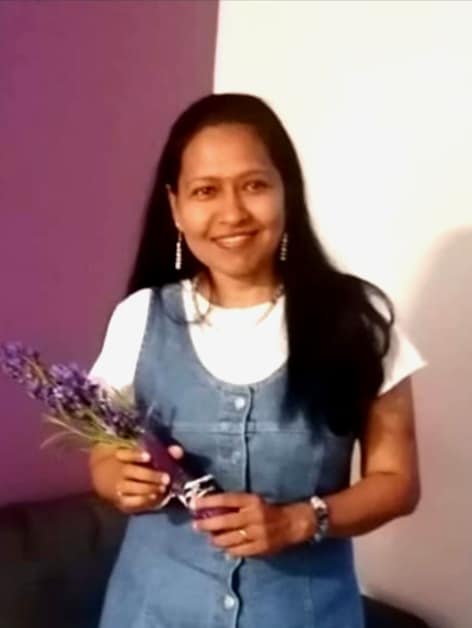
Celebrating diversity and encouraging women of all backgrounds to stop saying ‘why me?’ and replace it with ‘Why not me?’ is Susi Gaikwad’s passion.
Susi joined our Trust 29 years ago and, as well as being a talented Physiotherapist, she is one of our longest-standing members of our Equality, Diversity and Inclusion board.
She has an infectious drive and determination and has been instrumental in creating groups, activities and events to bring us all together.
She said: “First, happy International Women’s Day and cheers to all the inspirational women out there!
“It’s crazy how many years have passed by so quickly. This Trust and me embraced each other and I am so happy to be here – it’s become my career home.
“I feel privileged to support numerous people’s wellbeing and love my job, despite its demands.
“My wonderful mum taught me ‘wherever you are, help as much as you can, with what you have’. Introducing innovative ideas is my core strength and I love to deliver new, evidence-based therapeutic interventions for my patients, which are easier and more agreeable to them.
“Personally, me and my husband speak different Indian languages and are proud of our Asian Indian origin.
“Our two boys were born and grew up in this county so, over the years, I acknowledged the diverse identity that we brought in to the United Kingdom.
“I truly wish we had the Equality and Diversity and the black and ethnic minority support systems we have now in the 1990s.
“I guide as many international women buddies to join these support systems as possible, to enhance their understanding, communications and development while working in the United Kingdom.
“We all continually do our best, in both our personal and professional lives, and I believe we need to celebrate this every day, demanding respect, appreciation, value, care and love – demanding more from our society, in spite of our intersectionality.”
Our End of Life team
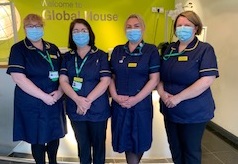
Sadly but inevitably, a key aspect of our role is to care for patients who are at the end of their life.
It’s incredibly important to us that they and their families are treated with the upmost dignity and respect and feel supported and cared for by our staff.
And that’s where our End of Life Team come in.
Claire Hebden is our Matron for Palliative and End of Life Care; Alison Redhead and Julieann Woollas are both End of Life Lead Nurses for Acute Services and Gemma Burke is our Clinical Practice Educator for End of Life Care.
Together, these dedicated women have worked hard to create a programme of support that can be tailored to the individual needs of patients and their families.
We call these the Bluebell Principles and the team has already seen first-hand what a huge difference it can make at this very difficult time.
Julieann said: “This is such an important time for patients and their families and it’s vital that we get it right.
“Often, it’s the little things that can make the biggest difference and that’s where the Bluebell Principles came from.
“For example, when a patient and their family receiving end of life care, a Bluebell symbol is displayed on the door.
“This ensures that all our staff – from the clinical teams to our volunteers – are aware this is a sensitive time and ensure patients and their families are given the space they need.
“It’s also important that the care and support we provide is guided by the patient and that we understand what’s important to them.
“We’re all busy but it’s particularly important for patients coming to the end of their life that we’re available and willing to give them time to ask questions or just listen to their stories. This gives incredibly valuable insight into what’s important to them and helps us to make their care more personalised.
“It also helps us to learn and adapt to what patients need from us.”
It’s as a result of feedback from patients and their families that the team has also invested a range of little items that can help to provide comfort.
These include toiletry packs for relatives who may have dropped everything to rush to be with a loved one, attractive hessian bags to take home jewellery and belongings and remembering books.
Julieann said: “One of the books is aimed at younger relatives and has areas for them to draw and write down memories and stories with their loved one.
“We also have some beautifully soft teddy bears, which some patients choose to give to their families as a keepsake and others keep as they find it brings them comfort.
“These may all seem like little things individually but, together, it can make a significant difference to patients and their families and that’s all that matters to us.”
Vicki Andrews – Volunteer Team Coordinator
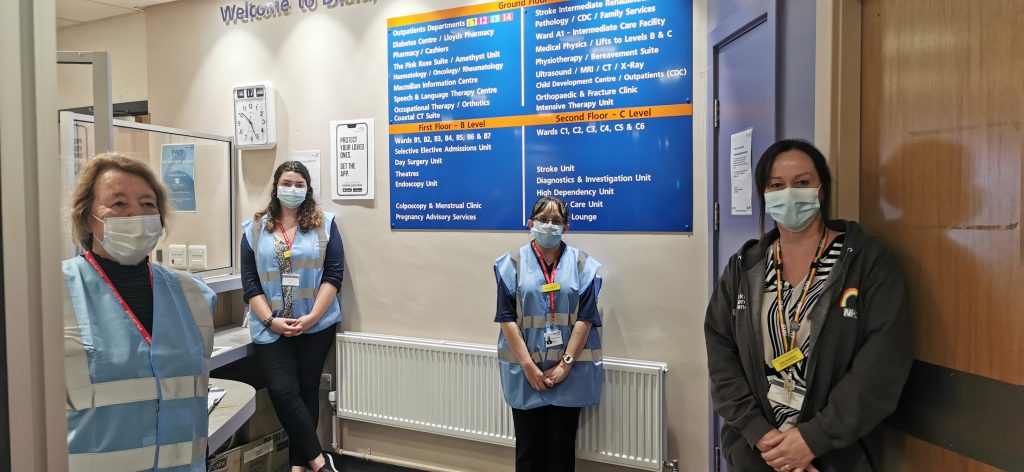
We’ve always been incredibly lucky at our Trust in attracting a dedicated and talented team of volunteers.
Prior to the outbreak of Covid, we had a team of more than 400 regular volunteers, carrying out a variety of roles across our sites.
However, in order to keep them safe and reduce the risk of infection, we had to ask them to take a step back.
Now it’s safe for us to welcome volunteers back into our hospitals we’ve been delighted to see the return of some old faces, as well as recruiting new members of the team.
And, heading it all up is our Volunteer Team Coordinator Victoria Andrews.
We caught up with her to find out more:
How did you get into the role?
I am currently on a secondment for a year with the Voluntary Services Team as the Volunteer Team Co-ordinator and hoping to secure a permanent post when it ends in June – fingers crossed as I love my job J
What’s the best part of the job?
I get to work with a fabulous little team and speak to new volunteers every day.
I’m always humbled by the time people are prepared to offer to our hospitals and excited by how our volunteers can make such a difference to our patients and staff.
Would you recommend NLaG as a place to work for women?
Absolutely, I have always been supported in my roles and I work with a team of inspiring women
Any advice for women looking to get into similar roles?
Go for it! I feel I have been able to make such a difference to our staff and patients by re-introducing volunteers to our hospitals.
If you feel you can do something amazing through a role/job and it inspires you to apply then do the homework, research the role and the work place and shout loud about what you can offer and the difference you can make
What are you most proud of?
I am so proud of the number of new volunteers I have been able to introduce to our hospitals and I have more to come!
This role has been a fantastic opportunity for me and I am keeping everything crossed I am around for a lot longer.
Find out more about a career with us or volunteering roles.
